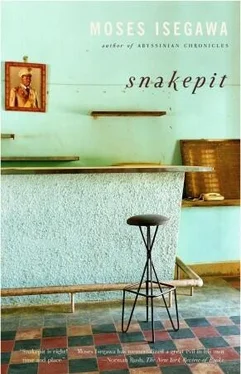“The situation is too hot. People are getting killed every day. Can you guarantee the safety of the child?”
“You talk like a mathematician. There are no guarantees in life.”
“I want to limit the risks. I don’t want to be at the office and at the same time wondering if my child is safe.”
“I want to have the baby.”
“It would be best for you to return to your home. I will give you financial support.” Bat’s heart was beating even harder; not only was he facing rebellion from the person closest to him; he did not know what would come of all this.
“I want to stay with you. I have no family,” Victoria said, infusing her voice with genuine desperation.
“You have friends. You can always hire help.”
“It is not the same thing. I want to be with you, cook for you.”
“I already have a cook. All I need is space to concentrate on my work. If you insist on staying, well, it is a big house. You will get bored to death. If you decide to leave, inform me.”
It was not terribly romantic, but she wanted a foot in the door. Some dreams needed a little pushing along the way. “It is fine with me. I want to stay and share God’s blessing with you.”
A WEEK LATER Bat received news that the Professor’s brother had been found dead near his home. He drove to the Professor’s home located on one side of Makerere University Hill. The journey brought back memories, his university days, the post-independence political situation, especially the bombardment of the king’s palace in 1966 by Colonel Amin on the orders of President Obote. It was the longest and most frightful gun battle he had ever heard. At one time he thought the whole city had been bombed to the ground.
He parked outside the Professor’s house, took a long breath and got out of the car. His friend came out to meet him, his teary eyes red. As he hugged him, he felt the Professor’s arms shaking. They sat down on the veranda and looked into the distance.
“If things continue this way, I will seriously consider emigrating. What sort of country is this where people get killed for no reason? State Research Bureau boys found him walking home, accused him of supporting dissidents, took his money and watch, and when he resisted, they killed him. In broad daylight!” the Professor said, hardly able to contain his rage.
Bat found it hard to mount a response. “I am sorry about this. I wish there was something I could do. I would really not blame you if you decided to go abroad. The country has become a snakepit. It is a shame we have not yet found a way to get rid of the vipers.”
“I have lost the most precious thing: pleasure in work,” the Professor lamented, shaking his head vigorously, like a drenched zebra. “I often think that many of my students are members of the Bureau, ready to twist my words and get me killed.”
“Maybe you should leave the country,” Bat suggested again, wondering how his friend would fare abroad. Settling in, getting a job, balancing a new identity with the old one.
“I have thought about lecturing in Kenya or Zambia. I have colleagues there. If it hadn’t been for you and the Kalandas, I would have left already. But somehow I don’t want to go. I keep thinking it will get better.”
“Unfortunately, I can’t help you make up your mind,” Bat admitted, “but whatever decision you take, I will be behind you.”
“I will think about it after the funeral.”
Bat took the afternoon off to attend the funeral. He perused the day’s newspaper in the car. It read like Amin’s diary. The day before, Amin had met the new Libyan ambassador, visited a hospital, distributed sweets to limbless children and also made a speech at a graduation parade for police cadets. The rest of the paper was full of advertisements by astrologers promising miracle cures for anything from poverty to psychosis to psoriasis. The advertisements were never edited, resulting in the most deplorable spelling mistakes he had ever seen: “pavaty” for “poverty,” “cyclesis” for “psychosis,” “sorryasis” for “psoriasis” and the like. It was so bad he started chuckling. He threw the paper in the back of the car and hoped the cook would use it to light the Primus stove or to wipe his ass. He remembered the Learjet at the airport and wondered who Dr. Ali really was. He had attended many government functions, but he had never met the man. As he got onto Jinja Road, it struck him that Dr. Ali was a very clever man; he was milking the regime without showing his face, the kind of man who could walk down the street unrecognized. One thousand dollars per consultation was not bad. No wonder his followers called him God. It occurred to Bat that if there was anybody who could kill Amin and rid the country of the scourge, it was this mysterious man.
At the entrance to the Mabira Forest, chills went down Bat’s spine. The density of it, the height of the trees, the possibilities for robbery and carjacking. Rumours had it that soldiers dumped bodies somewhere in its depths. He put his foot on the gas, adrenaline pumping. Many kilometres later, the sky cleared and he gave a sigh of relief.
The deceased had been a builder, and his house was a stout red-roofed brick structure. The place was crawling with mourners dressed in every colour under the sun. Burials always put Bat on edge. Caught between the corpse and the raw grief of the bereaved, some of whom seemed out of their minds, he felt redundant, an intruder. Words of consolation felt so weightless, so hackneyed. Each time, one was confronted with the fact that people never got used to violent death: it still shocked, the lamentations pierced with genuine sorrow. His feelings were now complicated by the fact that he was expecting a child. It made the insinuation of death in his life more poignant. Before, it had been him against the world; death on the job had seemed heroic, even glorious. But now he felt responsible for the baby; he had to protect it, provide for it. It was the impossibility of protecting anybody with any degree of certainty these days that bothered him most.
Among the mourners were some saying that the killing had a business motive behind it. They claimed that a competitor had hired the killers to get rid of his rival and take over his business. There were cries of “eye for an eye.” The Professor wisely kept out of the commotion.
The deceased was lying in the sitting-room, his jaw tied with a white cloth, his nostrils plugged with cotton wool. The sight of his orphaned children made Bat wonder what words of wisdom a parent could offer a child nowadays. Turn the other cheek? Do good when evil men were having their way? Be sensible when sense was being rewarded with punishment? The legacy to be left for the next generation struck him as one of the hardest things his own generation had to drum up. He had the impression that everyone had been touched by an evil wind, whose chill would grind on into the next generation. Maybe even beyond. How would a generation of passive parents and confused children affect the future?
The burial ceremony ground along for an hour. Bat’s attention was beginning to wander when he saw a young woman he had noticed earlier on. When he first saw her, she looked as if she was waiting for somebody. Maybe him. Why he thought that, he could not tell. She was wearing a skirt and a blouse and flat shoes. She had a good shape, soft features and an open face. She seemed the exact opposite of him, but he felt something when he looked at her. He called a boy who was passing by and told him to fetch her. Why did she look surprised? She looked stiffly in his direction as if peeking at something forbidden, but she finally came.
He was leaning against his car, arms on his chest. He liked the warmth of her voice, her rapt attention. She listened carefully, as if looking for faults, lies, inconsistencies in a sworn testimony. It soon started to rain. He took shelter in his car and watched as she got soaked, making up her mind whether to follow him in or seek shelter elsewhere. She sat in the back and he watched her in the driving mirror. Her name was Babit and she had two brothers and three sisters, she said, cracking her knuckles with nerves. As he listened to her voice, he dreamed of taking her with him. Did he want to listen to that same voice year in and year out? Probably. See the same face, lie next to that same body? Probably. How long would it last? Probably very long. Who would give in first? Probably him. Would the good memories outweigh the bad ones in the end? How would he remember her? As a shadow, a feeble sensory perception? A lovable entity? A voice? Or simply as Victoria’s successor? How would she remember him?
Читать дальше











